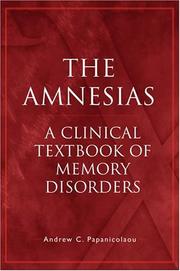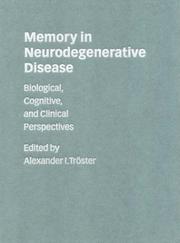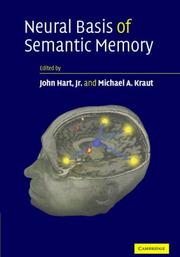| Listing 1 - 10 of 13 | << page >> |
Sort by
|

ISBN: 1281143359 9786611143350 1846427193 9781846427190 9781281143358 9781843108634 1843108631 6611143351 Year: 2007 Publisher: London Philadelphia Jessica Kingsley Publishers
Abstract | Keywords | Export | Availability | Bookmark
 Loading...
Loading...Choose an application
- Reference Manager
- EndNote
- RefWorks (Direct export to RefWorks)
'A Personal Guide to Living with Progressive Memory Loss serves as a commitment to inclusive education and is a landmark self-help book that focuses on the needs of the person with the diagnosis. It expands what is currently offered to people with memory loss in a sensitive and contemporary way. A must have for every memory clinic and health and human service agency.'. - Linda L. Buettner, Professor at the University of North Carolina at Greensboro, Alzheimer's Association Early Stage Task Force. 'This book empowers people living with dementia, signposting hope, choice and a life to be lived.
Memory disorders --- Impairment, Memory --- Memory, Disorders of --- Memory impairment --- Paramnesia --- Cognition disorders --- Prevention

ISBN: 1280534583 0198038526 9781280534584 9780198038528 0195172450 9780195172454 019770557X 0190291524 Year: 2006 Publisher: Oxford New York Oxford University Press
Abstract | Keywords | Export | Availability | Bookmark
 Loading...
Loading...Choose an application
- Reference Manager
- EndNote
- RefWorks (Direct export to RefWorks)
This is a clinical text on the disorders of memory that result from psychological stress, traumatic injury, strokes, or degenerative diseases of the brain. Each amnesia syndrome is dealt with in a separate chapter that includes a clear account of the symptoms and the tests used to assess them.
Memory disorders. --- Impairment, Memory --- Memory, Disorders of --- Memory impairment --- Paramnesia --- Cognition disorders --- Amnesia --- Memory --- physiopathology. --- physiology.
Book
ISBN: 9781619427112 1619427117 9781619426993 1619426994 Year: 2012 Publisher: New York Nova Science Publishers
Abstract | Keywords | Export | Availability | Bookmark
 Loading...
Loading...Choose an application
- Reference Manager
- EndNote
- RefWorks (Direct export to RefWorks)
Long-term memory. --- Memory disorders. --- Impairment, Memory --- Memory, Disorders of --- Memory impairment --- Paramnesia --- Cognition disorders --- Long-term retention (Memory) --- Memory
Book
ISBN: 144222049X 9781442220492 1299613977 9781299613973 9781442220485 1442220481 Year: 2013 Publisher: Lanham
Abstract | Keywords | Export | Availability | Bookmark
 Loading...
Loading...Choose an application
- Reference Manager
- EndNote
- RefWorks (Direct export to RefWorks)
As our population ages and fears about dementia, Alzheimer's, and related brain problems continue to grow, this book will help shed light on how the brain functions, what we can do to prevent the most severe symptoms of aging, and steps we can take to ward off disease.
Brain --- Memory disorders --- Impairment, Memory --- Memory, Disorders of --- Memory impairment --- Paramnesia --- Cognition disorders --- Cerebrum --- Mind --- Central nervous system --- Head --- Diseases --- Prevention --- Aging
Book
ISBN: 1139950312 1139961985 1139949268 1139960938 1139956698 1139958828 1139957767 1139959875 1139547380 9781139957762 9781139547383 9781139959872 9781107035225 1107035228 1316623262 9781316623268 Year: 2014 Publisher: New York
Abstract | Keywords | Export | Availability | Bookmark
 Loading...
Loading...Choose an application
- Reference Manager
- EndNote
- RefWorks (Direct export to RefWorks)
When the memory retrieval process breaks down, people wonder exactly why and how such a thing occurs. In many cases, failed retrieval is accompanied by a 'tip-of-the-tongue state', a feeling that an unretrieved item is stored in memory. Tip-of-the-tongue states stand at the crossroads of several research traditions within cognitive science. Some research focuses on the nature of the retrieval failure. Other research tries to determine what tip-of-the-tongue states can tell us about the organization of lexical memory - what aspects of a word we can recall when we are otherwise unable to do so. Still other research focuses on the nature of the experience. Each perspective is represented in this book, which presents the best theoretical and empirical work on these subjects. Much of the work is cross-disciplinary, but the topics concern strong phenomenological states of knowing that are not accompanied by recall or recognition of the desired information.
Memory disorders. --- Metacognition. --- Recollection (Psychology) --- Recall (Psychology) --- Memory --- Recognition (Psychology) --- Meta knowledge --- Metamemory --- Cognition --- Self-control --- Self-perception --- Impairment, Memory --- Memory, Disorders of --- Memory impairment --- Paramnesia --- Cognition disorders
Book
ISBN: 1282737481 9786612737480 0080932363 0444531742 9780444531742 9780080932361 Year: 2008 Publisher: Amsterdam : Elsevier,
Abstract | Keywords | Export | Availability | Bookmark
 Loading...
Loading...Choose an application
- Reference Manager
- EndNote
- RefWorks (Direct export to RefWorks)
Episodic memory is the name of the kind of memory that records personal experiences instead of the mere remembering of impersonal facts and rules. This type of memory is extremely sensitive to ageing and disease so an understanding of the mechanisms of episodic memory might lead to the development of therapies suited to improve memory in some patient populations. Episodic memory is unique in that it includes an aspect of self-awareness and helps us to remember who we are in terms of what we did and what we have been passed through and what we should do in the future. This book brings t
Memory. --- Memory disorders. --- Cognitive neuroscience. --- Cognitive neuropsychology --- Cognitive science --- Neuropsychology --- Impairment, Memory --- Memory, Disorders of --- Memory impairment --- Paramnesia --- Cognition disorders --- Retention (Psychology) --- Intellect --- Psychology --- Thought and thinking --- Comprehension --- Executive functions (Neuropsychology) --- Mnemonics --- Perseveration (Psychology) --- Reproduction (Psychology)
Book
ISBN: 9781631174728 163117472X 1631174711 9781631174711 Year: 2014 Publisher: New York
Abstract | Keywords | Export | Availability | Bookmark
 Loading...
Loading...Choose an application
- Reference Manager
- EndNote
- RefWorks (Direct export to RefWorks)
Delirium. --- Memory disorders. --- Impairment, Memory --- Memory, Disorders of --- Memory impairment --- Paramnesia --- Cognition disorders --- Acute brain syndrome --- Acute confusional states --- Brain syndrome, Acute --- Confusional states, Acute --- Neurologic manifestations of general diseases --- Psychological manifestations of general diseases

ISBN: 1107113431 128016168X 9786610161683 0511116500 0511155220 0511328702 0511544375 051105369X 0511019505 9780511019500 9780511053696 9780521571920 0521571928 0521571928 9780511544378 Year: 1998 Publisher: Cambridge New York Cambridge University Press
Abstract | Keywords | Export | Availability | Bookmark
 Loading...
Loading...Choose an application
- Reference Manager
- EndNote
- RefWorks (Direct export to RefWorks)
This book is the first to review in depth the neurobiological and clinical characteristics of memory and its disorders in neurodegenerative disease. It presents current information about memory disorders in Alzheimer's, Huntington's and Parkinson's diseases and in other neurological conditions such as progressive supranuclear palsy, Creutzfeld-Jacob disease and HIV-associated dementia. The contributors are among the most distinguished working in this field. They present the neuroanatomical and neurochemical basis of memory disorders in neurodegenerative disease, and review the contribution of neuroradiology and neuropathology to the understanding of memory and amnesia. Diagnosis, assessment and treatment issues are discussed, as are ethical and legal considerations and topics of emerging interest such as the early detection of dementia. Bringing together biological, cognitive and clinical information, this book will be an essential reference for clinicians and neuroscientists. It serves as an authoritative and up-to-date overview of the dementias and the prospects for treating them.
Memory disorders. --- Nervous system --- Degeneration, Nerve --- Nerve degeneration --- Nervous system degeneration --- Neurodegenerative disease --- Neurodegenerative diseases --- Neurodegenerative disorders --- Neuron degeneration --- Nissl degeneration --- Retrograde degeneration --- Wallerian degeneration --- Degeneration (Pathology) --- Impairment, Memory --- Memory, Disorders of --- Memory impairment --- Paramnesia --- Cognition disorders --- Degeneration. --- Degeneration and regeneration

ISBN: 9780521848701 0521848709 9780511544965 9780511279126 0511279124 9780511277948 0511277946 9780511276132 0511276133 0511278527 9780511278525 0511544960 1280850353 9781280850356 0511277350 9780511277351 1107164745 9786610850358 0511321287 Year: 2007 Publisher: Cambridge, UK New York Cambridge University Press
Abstract | Keywords | Export | Availability | Bookmark
 Loading...
Loading...Choose an application
- Reference Manager
- EndNote
- RefWorks (Direct export to RefWorks)
The advent of modern investigative techniques to explore brain function has led to major advances in understanding the neural organization and mechanisms associated with semantic memory. This book presents current theories by leading experts in the field on how the human nervous system stores and recalls memory of objects, actions, words and events. Chapters range from models of a specific domain or memory system (e.g., lexical-semantic, sensorimotor, emotion) to multiple modality accounts; from encompassing memory representations, to processing modules, to network structures, focusing on studies of both normal individuals and those with brain disease. Recent advances in neuro-exploratory techniques allow for investigation of semantic memory mechanisms noninvasively in both normal healthy individuals and patients with diffuse or focal brain damage. This has resulted in a significant increase in findings relevant to the localization and mechanistic function of brain regions engaged in semantic memory, leading to the neural models included here.
Cognitive psychology --- Physiology of nerves and sense organs --- Lexicology. Semantics --- Psycholinguistics --- Memory. --- Memory --- Cognitive neuroscience --- Retention (Psychology) --- Intellect --- Psychology --- Thought and thinking --- Comprehension --- Executive functions (Neuropsychology) --- Mnemonics --- Perseveration (Psychology) --- Reproduction (Psychology) --- Physiological aspects. --- Memory disorders. --- Language disorders. --- Neuropsychology. --- Semantics. --- Formal semantics --- Semasiology --- Semiology (Semantics) --- Comparative linguistics --- Information theory --- Language and languages --- Lexicology --- Meaning (Psychology) --- Neurophysiology --- Psychophysiology --- Dysphasia --- Communicative disorders --- Impairment, Memory --- Memory, Disorders of --- Memory impairment --- Paramnesia --- Cognition disorders
Book
ISBN: 1684481511 1684481473 9781684481514 Year: 2019 Publisher: Lewisburg, Pennsylvania
Abstract | Keywords | Export | Availability | Bookmark
 Loading...
Loading...Choose an application
- Reference Manager
- EndNote
- RefWorks (Direct export to RefWorks)
Suzanne Farrell Smith’s father was killed by a drunk driver when she was six, and a devastating fire nearly destroyed her house when she was eight. She remembers those two—and only those two—events from her first nearly twelve years of life. While her three older sisters hold on to rich and rewarding memories of their father, Smith recalls nothing of him. Her entire childhood was, seemingly, erased. In The Memory Sessions, Smith attempts to excavate lost childhood memories. She puts herself through multiple therapies and exercises, including psychotherapy, hypnotherapy, somatic experiencing, and acupuncture. She digs for clues in her mother’s long-stored boxes. She creates—with objects, photographs, and captions—a physical timeline to compensate for the one that’s missing in her memory. She travels to San Diego, where her family vacationed with her father right before he died. She researches, interviews, and meditates, all while facing down the two traumatic memories that defined her early life. The result is an experimental memoir that upends our understanding of the genre. Rather than recount a childhood, The Memory Sessions attempts to create one from research, archives, imagination, and the memories of others. Published by Bucknell University Press. Distributed worldwide by Rutgers University Press.
Memory disorders --- Autobiography --- Psychic trauma in children --- Fathers --- Fires --- Impairment, Memory --- Memory, Disorders of --- Memory impairment --- Paramnesia --- Cognition disorders --- Dads --- Men --- Parents --- Househusbands --- Child psychopathology --- Autobiographies --- Egodocuments --- Memoirs --- Biography as a literary form --- Buildings --- Conflagrations --- Fire losses --- Accidents --- Disasters --- Fire --- Patients --- Authorship --- Psychological aspects --- Death --- History and criticism --- Technique --- Fires and fire prevention --- Farrell Smith, Suzanne --- Smith, Suzanne Farrell --- Childhood and youth. --- Mental health. --- memoir, memory loss, amnesia, traumatic memory, childhood memory, parental loss, childhood trauma, loss of father, memory recovery, writers' memoir, transformative memoir, immersion writing, cognition, memory, cognitive psychology, neuropsychology, autobiography, mind, brain, experimental autobiography.
| Listing 1 - 10 of 13 | << page >> |
Sort by
|

 Search
Search Feedback
Feedback About UniCat
About UniCat  Help
Help News
News